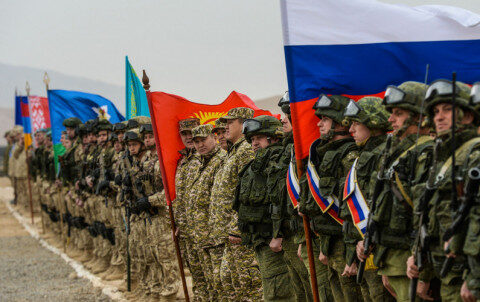The inclusion of Syria in the CSTO meets the interests of Russia

МОСКВА, 28 августа 2021, Институт РУССТРАТ.
The head of the Main Military-Political Department of the Russian Defence Ministry, Andrey Kartapolov, recently announced the possibility of including Syria in the Collective Security Treaty Organisation (CSTO). The CSTO Charter is not a dogma, it must meet the immediate situation, if such a step will be beneficial to all parties to the Treaty, including Syria, then why not.
It is generally true, but the question arises about the degree of reality of such a prospect. Any coin, as is known, has two sides that simultaneously answer the question “why”. Why does Russia need this, and how will the other CSTO partners look at this idea?
At first glance, the initiative of Colonel-General Kartapolov looks strange. For decades, the CSTO has been a project for the sake of the project itself. Formally, Armenia, Belarus, Kazakhstan, Kyrgyzstan and Tajikistan allegedly have a military alliance with Russia, summit meetings and periodic exercises of army units are held within its framework, but in fact few people believed in the readiness of the allies to send their troops to protect “not their own interests”. The appearance of Syria in this still pond looks absolutely uninteresting to anyone.
But this picture looks like that only at first glance. Such a situation, at least, does not suit Russia, for whose image the “military bloc that does not exist” causes damage. In addition, we cannot ignore the dramatic change in the situation in Afghanistan, which threatens to increase the scale of the expansion of Islamist radicalism into Central Asia, and against which it is certainly necessary to defend ourselves collectively in the region, and there is even a suitable mechanism for this, but it works frankly poorly.
It may seem strange, but it is the appearance of Syria in the CSTO that can provide the necessary conditions for the radical modernisation of the military-political union.
Firstly, unlike abstract international terrorism, Islamist radicalism is quite concrete and is more than understandable for the ruling elites of the Central Asian countries. Especially in connection with the return of the Taliban to power in Afghanistan. Although there have been talks about such a prospect for almost seven years, the Central Asian armies were not ready to effectively repel such a threat.
They, from the rank and file to the highest command staff, need to be taught, but it is ineffective to do this only at peaceful training grounds. Syria’s joining the CSTO is potentially able to provide opportunities for organising combat training “in conditions close to real”. How this works can be easily seen by the example of the growth of the effectiveness of the Russian army, which has been helping the government forces of the SAR since 2015.
Moreover, what is important, is that the allies will be able to “learn” actually against the same enemy that they will inevitably face at home in the very near future. And even if they still can “delay” the issue of consent to the admission of Syria to the CSTO, then they will have to defend themselves from armed Islamists on their own territory in any case. This is a very strong incentive. At least, for the allies from Central Asia, because Minsk, in the current configuration of events, will be able to pretend that what is happening does not concern it for a long time.
Secondly, one of the key problems of the friability of the CSTO is the constant desire of the “allies” for “multi-vector” behaviour, which results, among other things, in flirting with the West, especially with the United States. Syria’s admission to the Organisation will automatically end this freedom.
There will be a situation which is directly prescribed in the charter of the Organisation – an attack by an external enemy on one of the allies. In Syria, it is implemented in its pure form – American military units are illegally located on the territory of the SAR and are actually, albeit indirectly through local Kurds, waging war against the Syrian government army.
Thus, the CSTO members will have to choose “who to be friends with”. While it is not at all a fact that they will make a choice in favour of Russia, but the dynamics of events in Afghanistan no longer allows them to wave a sabre in the style of “I’m leaving”. The ruling elites of Central Asia guess that the United States will not help them, and they simply will not withstand that without Russia.
In short, the idea voiced by the head of the Main Military-Political Directorate of the Russian Ministry of Defence is at least interesting and is an excellent test balloon for allies who are invited to think about their position. Whether something will come out of it or not is still an open question. But it is obvious that Moscow is tired of the constantly failing military bloc due to the allies and is starting to modernise it.
 Институт международных политических и экономических стратегий Русстрат
Институт международных политических и экономических стратегий Русстрат
(@russtrat)

